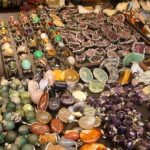Introduction to Jewelry Making School
Jewelry making is a popular hobby, as well as a lucrative business venture. If you’re interested in making your own jewelry, you may want to attend a jewelry making school. Jewelry making classes will teach you the skills and techniques needed to craft beautiful one-of-a-kind pieces and to design unique pieces for others.
At a jewelry making school, there are many different types of classes available. Some classes focus on the technical aspects of metalsmithing such as soldering and filing, while other classes focus on the creative side like beading or mold casting. Certain classes may also specialize in certain styles like wire wrapping or cabochons. Classes that focus on jewelry repair or restoration can also be found at some schools. The types of materials used vary from class to class but include things like silver, gold, brass, copper, gems and even plastics.
When choosing a jewelry making school it is important to look for programs that have experienced instructors who have professional experience crafting jewelry. Quality instruction is key because it ensures that students learn the proper techniques and methodology used by professional jewelers. Additionally, check to make sure that students will have access to quality tools during the class in order for them to practice what they’re learning – this could include pliers, saws, hammers and more. Lastly if possible try visiting the school before enrolling so that you can get an idea of what it’s like attending courses there firsthand – this will allow you to determine if it’s the right fit for you!
The Benefits of Attending Jewelry Making School
Attending jewelry making school offers a unique opportunity to gain valuable knowledge and skills from experienced professionals. By studying from those in the industry, students will benefit in multiple ways. Not only will they gain an understanding of the different aspects of working with jewelry, such as metalworking, stonesetting, beading, and design, but they’ll also have direct access to people who can help them refine their craft. This results in a deeper level of skill that would otherwise take many years of practice and experimentation to acquire.
Attendees can expect to become more technically savvy with each passing day after finishing the program. From mastering the use of specialized tools to becoming an expert in creating custom pieces, the experience gained is invaluable. Many aspiring designers are able to immediately enter the jewelry making industry right out of school due to the high-quality education provided by these programs. Furthermore, graduates find themselves more prepared than ever before when it comes time for interviews or landing positions within in-demand studios.
Expert Guidance at Jewelry Making School
Finding the right mentor for your jewelry making course is an important step in your learning process. A good mentor will provide guidance and excellent skill-building advice, as well as helping you to better understand complex concepts. Before settling on a mentor, consider their credentials and teaching style to ensure that they are capable of inspiring and motivating you during each session.
The best mentors often have years of experience in the craft and industry which can be invaluable when it comes to identifying ways to improve upon methods, understand different materials, and master new techniques. Additionally, a reputable instructor should have a wide variety of resources at their disposal that they are willing to share with students such as relevant books, tools, and materials needed for specific tasks.
Support from experienced instructors is also beneficial since they have developed a greater understanding of what’s involved with mastering this form of art. They can provide technique demonstrations as well as project ideas”and perhaps most importantly”give feedback on how to better one’s work. Look for courses that offer opportunities to ask questions throughout the lesson and critiques from instructors afterward. A product perspective is extremely helpful because it allows you to see what aspects may need further attention before bringing it into the field or selling it online or in a setting such as a gallery or store.
Crafting the Perfect Jewelry in School
Jewelry making school is an excellent way to hone your skills and unleash your creativity. By attending a jewelry making school, you can gain an understanding of the necessary skills and equipment for crafting stunning pieces of jewelry. Jewelry making schools generally offer hands-on, project-based learning in which students can learn how to use the tools required for each process involved in creating unique pieces of jewelry.
The tools used by jewelry makers vary depending on their complexity, with many professionals utilizing a variety of hand tools, electric tools and machines. Manual use of hand tools such as pliers and cutters is common practice when cutting and joining components together, along with using tweezers to fit small components accurately. Electric machinery is often used for shaping metals into specific sizes or shapes, creating drills for linkages between parts and grinding stone settings onto rings for example.
In a typical workshop session at a jewelry making school, students will learn how to correctly pre-plan a piece, sketch out designs if desired, select materials and measure correctly before commencing any joining or cutting steps. Students are shown how to use the appropriate materials while cutting connectors before moving on to soldering or welding them in place if necessary. Finishing techniques may include filing away any sharp edges formed during cutting or welding while processes such as polishing or adding patinas may be demonstrated if desired.
By attending a jewelry making school and completing sessions of instruction, you can hone your basic craftsmanship skills that are needed when crafting unique jewelry pieces ” be it necklaces, earrings, bracelets or more!
Creative Inspiration and Networking at Jewelry Making School
Networking is an extremely important part of any creative endeavor and Jewelry Making School takes this to heart. By offering students and instructors the ability to connect on common goals, students gain insight into different ways of thinking and a fresh wave of ideas for inspiration. Instructors, in turn, are able to share their knowledge and experience with peers in order to further help jewelry makers reach their own potential.
Networking gives individuals involved in these creative endeavors the opportunity to further develop their creativity through examples found in others. It allows new learners who may be intimidated by the unknown possibility of jewelry making to safely find what works best for them, as well as fosters a sense of support that can’t be replicated with just books or tutorials. It encourages collaboration between like-minded jewellery makers, leading to even more innovative designs and techniques learned from each other.
Through networking, both students and instructors also can gain access to helpful resources that are not easily accessible otherwise. Sharing feedback helps everyone rise up together, enabling them all to stay current on trends others have noticed in order to stay competitive in the industry. Lastly, networking grants those creative minds access to tools developed by others that were previously out of reach before forming valuable relationships with those jewelsmiths around them at Jewelry Making School.
Career Opportunities After Jewelry Making School
Jewelry making is a sought-after skill that can lead to a variety of career opportunities. With a background in jewelry making, one can pursue jobs such as jeweler, benchworker, jewelry designer, gemologist or even setter. Those skilled in the art are able to create beautiful pieces that have meaningful value to their maker and the people around them.
Jewelers are employed by retail shops, restoration studios or manufacturing plants to design and assemble fine jewelry pieces. Benchworkers operate within these same settings by performing crafting and polishing tasks necessary for the manufacturing process. Jewelry designers provide consultation services for customers looking for custom created items based on personal taste or occasion. They rely heavily on knowledge about metals, diamonds and gemstones when creating unique pieces as well as determining cost estimates for labor/materials involved. Gemologists specialize in grading gems used in any new piece of jewelry, and setters use specialized tools to attach beads and other small components onto larger items like necklaces or brooches.
Many organizations feature classes focused solely on jewelry making techniques taught by certified teachers which can help prospective craftspeople hone their skills further or serve as entry points into longer trade programs. In addition, many jewelry associations like The American Gem Society offer resources such as certification programs, industry advisement and advocacy support to promote better professionalism among practitioners by establishing recognized standards in quality salesmanship and professional conduct when dealing with customers.
Conclusion
When deciding on a jewelry making school, it is important to consider factors such as cost, teacher experience and background, level of detail instructed and covered by the courses, number and variety of tools provided during the course, and whether the school or the student will be responsible for providing materials. Additionally, check to see if any student testimonials are available ” they can provide invaluable feedback on quality of instruction. Once you have chosen your jewelry making school, take full advantage of the instruction and guidance offered to help develop your skills. Remember that learning quality techniques can save you time and money in creating pieces worthy of being displayed or sold with confidence. By engaging with different teachers at varying levels, you can broaden your knowledge base while receiving valuable insight to expand your creative abilities.

Welcome to my jewelry blog! My name is Sarah and I am the owner of this blog.
I love making jewelry and sharing my creations with others.
So whether you’re someone who loves wearing jewelry yourself or simply enjoys learning about it, be sure to check out my blog for insightful posts on everything related to this exciting topic!





